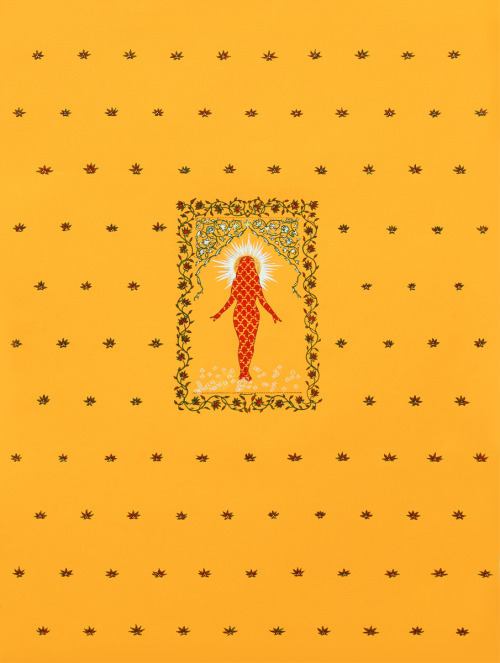
florentine, by Komail Aijazuddin
By Claudio Iglesias &Â Jessica Sequeira
The day we changed hotels we woke up in a good mood. We embraced a while in bed, then came down to breakfast. In the modest and silent lobby we ate papayas with cheese and yogurt with cereal, drank tea and coffee. We stayed for some time talking and reading: one of us with Somerset Maugham, one with Miguel Cané. Morning went on, at intervals the room filled and emptied. We thought of changing hotels, since our room lacked light. We wanted to feel something different. Going out dancing we liked what we saw of the Diplomat, its concrete building and neon. It seemed at the same time modern and obsolete, corporate and full of fantasy. But before anything else we had to change money. In a passage on España street, a gorgeous colonial arcade facing a rectangular plaza, we swapped currency promptly and efficiently. This gave us great pleasure. On our way out we stopped at a bookstore, also colonial, to browse works by local authors. The man at the front desk ordered stock, his assistant passed the vacuum between sets of tall shelves. We looked around at the books, carpets and wooden fixtures, the whisky bottle hidden behind the counter. We bought ‘Literatura boliviana’ by Francisco Diez de Medina and started to flip through it in the neighboring café. Old men sat at sidewalk tables, chatting briefly before tender goodbyes, as if afraid they wouldn’t see each another again. We came back to our old hotel in a good mood, and before leaving embraced once more. Chau, hotel. It was nice but time for something new: wide views of hills, soft pillows that caress the ear, heavy wood desks beside the bed. We wanted a classical experience of tourism. We made it to the junior suite of the new place in a good mood and started to fuck, slow but hard. We moved around the room, over bed and floor, without clothes but with patience. Bourbon sex: reformed sex. From bed to pillow and reverse, up and down. We couldn’t finish and neither could we sleep. We went looking for a museum or something to see: everything closed. We found a café. An essay occurred to us, or the theme for an essay: ideas about things that were happening. An idea of love that was intense but joyful, a pleasant form of liberty. A homage to colonized countries and their cultural enterprises. The relationship between the concept of art and its industry, a relationship that while necessary improves with porosity. We returned hungry. We wanted to bathe, wanted to drink rum. We wanted to write or smoke on the balcony. The horizon appeared to expand as the sun went down. The new hotel was radiant. We were exhausted with yogurt, chess, wine. We wanted to sleep. But we were in a very good mood.
Claudio Iglesias is an art critic in Buenos Aires, author of ‘antologÃa del decadentismo francés’, ‘falsa conciencia’ and ‘rubias teñidas’.
Jessica Sequeira is a writer and translator living in Buenos Aires.




